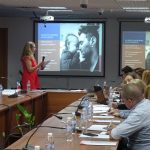Recommendations of Karin Dom’s Team in the Field of Inclusive Education in our Country

Karin Dom Foundation organized a round table: “Addressing recommendations for changing policies for inclusive education” on 4 July 2022 in Sofia. At the round table, institutions, specialists, parents and civil organizations met and exchanged ideas, recommendations and successes. Karin Dom made specific proposals and recommendations to support the education of children with special needs. Recommendations for changing policies were presented, developed by Karin Dom’s team based on our experience and a number of consultations we did with various organizations, parents and specialists in the field. With the participants in the round table, we shared a unified vision about the urgent need for serious reforms, deeper analysis of the current situation and, of course, making specific steps and changes.
Several facts were highlighted as the most painful and urgent: the lack of a unified register of children with disabilities, the need for reform in the education system and the adaptation of teaching material and programs to be suitable for students with special educational needs, as well as the lack of sufficient number of qualified personnel in schools and kindergartens for working with children with special educational needs. During the meeting it became clear that a national program is being worked on to have a single register for children receiving additional support, which is an encouraging step forward, but we are still on the verge of launching significant and sustainable changes.
Karin Dom’s team officially addressed to all responsible institutions the following specific recommendations for improving the conditions, environment and understanding of the role and importance of inclusive education in Bulgaria. We are also willing to participate in a working group to search for urgent solutions:
- Introduction of a unified national information system, including a Register for children with disabilities and chronic diseases, to monitor the entire period of development of the child (0-18 years) and its family. There is a lack of a unified information system/register for children with disabilities that collects information and shares it with all specialists involved in the process of inclusive education. This would make possible to develop strategies for the overall management during the life and education of a child with special needs.
- Preparation of a “Roadmap” for the path of the child and its family – from birth to completion of education with opportunities for screening at several stages in early childhood, early diagnosis, developmental assessment, health, general and additional support for personal development, ensuring full social inclusion based on the rights of children and people with disabilities. To introduce a holistic approach to the child, that is tailored to the different skills of children and is an approach that prepares the child to enter life as an adult prepared. The advantage is that it is not only focused on mental development, but also on the psycho-social and emotional development of children, etc. In the process of diagnosis and receiving support, there is a lack of structured information about the path that families of children with developmental difficulties and disabilities must take. Families don’t know who to turn to, they look for different specialists and get contradictory information. The process takes time and effort and this delays getting support at an early age.
- Reduction of the number of children in the groups and classes to 20, and when there are children with special educational needs (SEN) to be reduced to 15. The large number of children in one group and in class (about 30-35) complicates the educational process and especially inclusive education efforts. Physically, it is even difficult to cover so many children with one teacher and assistant teacher. There is no resource left to provide individual attention to each child and meet his/her special educational needs. The reduction of groups and classes provided for in the legislation in the case of a child with SEN is very rarely used as an option. Here comes the issue of the shortage of teachers and, accordingly, places for children in kindergartens.
- Provision of assistants and specialists providing additional specialized support to children and students in the process of inclusive education. Providing more resource teachers in the education system to meet the needs of all children with SEN. As well as enough social and personal assistants to support children in kindergarten and in school.
- Revision of curricula and programs based on which children with special needs are tutored that are subject to inclusive education. Resource teachers and pedagogues should have the freedom to choose appropriate methods and approaches when including children with SEN and to be able to adapt the teaching content if necessary. At this stage, practice and feedback from parents and teachers shows that they are not tailored to the children’s capabilities, are not well developed as a series of steps and set impossibly high goals to achieve. Support plans for children with special educational needs need to be based on Functional Assessment of Knowledge and Skills. In addition to goals, specific steps and tasks to achieve them should be laid down in them as well.
- Improving accessibility to kindergartens and schools for children with special needs, children from different ethnic groups and refugees, children from vulnerable social groups living in poverty, children living in remote areas and children at risk of dropping out of the education system. Many parents share that they encounter difficulties in enrolling children with SEN in daycare and school. For children from remote areas of the country, access to education is limited. Specialists, services and support for children living in small settlements far from regional cities are also lacking or insufficient. Families have to travel long distances to get their children the support they need. Seeking outreach opportunities for additional support and therapeutic services for children from remote areas and small towns. For example, through Mobile services for additional support for personal development – not only Regional Centers to provide additional support in kindergartens and schools.
- Introduction of a family-oriented approach in the educational, social and health system. A policy aimed at stimulating and providing ample opportunities and prerequisites for parents to enter the labor market.
- Updating of the algorithm of interaction between institutions in the system of preschool and school education, Social Assistance Directorates and providers of social services regarding support for the personal development of children and students. Although there is an algorithm of interaction between institutions in the system of preschool and school education and Social Assistance Directorates regarding support for the personal development of children and students, it is necessary to revise it and build a more encompassing and effective mechanism for effective cooperation between all institutions dealing with children with special needs and their families. This will ensure continuity between institutions in the transition of each child from one place to another. To provide ongoing support for each child throughout the developmental period. This will also reduce the burden on parents for passing on information and looking for opportunities for support. This can also be done through a general law for the child, which would regulate and coordinate the work of the social, health and social ministries in the process of inclusive education. Coordinating units can be created at the regional level to coordinate the activities of the health, social and educational structures in relation to the diagnosis, provision of information and referral of children with special needs to the appropriate health, social and educational services. This can be a system including Regional Diagnostic Centers at medical facilities, including medical specialists (psychiatrists, neurologists, orthopedists, etc.), psychologists, speech therapists, special teachers, physiotherapists, occupational therapists, social workers.
- Increasing the knowledge and skills of teachers in kindergartens and schools for working with children and students with special educational needs. At the same time, it is necessary to change the existing attitudes that work with children with SEN is highly expert and should be done by the resource teacher or other resource specialist.
- Improving the effectiveness of teamwork within the TSPDC (Team for support of the personal development of the child). This will speed up the assessment of the child’s capabilities and needs and provide timely support without wasting time. To have effective participation of the teachers of the group/class, as well as of the parents. To have more time for case discussions, joint development of support plans, supervisions, interventions and teamwork.
- Periodic update of the financial provision in the education system, determined by the uniform cost standard, which does not cover all the needs of inclusive education. The financial provision in the education system, determined by the uniform cost standard, does not cover all the needs of inclusive education. This necessitates looking for additional sources of funding. There is a lack of aids and equipment in classrooms where children with mobility constraints are taught – specialized chairs and tables for example.
- Key competences – similar to the pillars in Icelandic education: literacy, sustainability, health and well-being, democracy and human rights, equality and creativity, to develop in an accessible language the key competences laid down in the Bulgarian education system: language literacy; communication competence; mathematical and science, technology and engineering competence; digital competence; personal competence, social competence and learning competences; civil competence; entrepreneurial competence; cultural awareness and expression competence. Comparing the main pillars of Icelandic education and the basic competencies in Bulgarian education, they differ significantly. Some focus on social interaction skills, while others prioritize cognitive development. Relative to children with SEN, the competences set in this way are not achievable for a large part of the children.
- Programs for recreation and rest for children with special needs and their families in suitable recreation centers with accessible environment.
The forum was opened by: Borislava Cherkezova, Executive Director of Karin Dom Foundation, representatives of Karin Dom took part in presentations: Nicoleta Yoncheva, doctor of speech therapy, Zhenislava Sapundjieva, Director of Services for children and families, Bistra Boncheva, Administrative Director of Foundation Karin Dom and social worker.
The discussion included representatives of: MLSP (Ministry of Labor and Social Policy), RCPIE-Sofia (Regional Center for Support of the Process of Inclusive Education), CSES “Edward Segen”-Sofia (Center for Special Educational Support “Edward Segen”), representative of the New Bulgarian University and consultant for UNICEF (Early Childhood Intervention), Parents Association, National Network for Children, Sofia University, Active Citizens Fund, Iglika Kindergarten, Varna, parents of children with special needs.
The forum is part of the initiatives under the project “Transfer of practices to improve support for children with special needs and their families for inclusive education”, financed by the Bulgaria Active Citizens Fund under the Financial Mechanism of the EEA 2014-2021.
All responsibility for the content of the published information is borne by Karin Dom Foundation and under no circumstances is to be assumed that it reflects the official opinion of the FM of the EEA and the Operator of the Active Citizens Bulgaria Fund.









